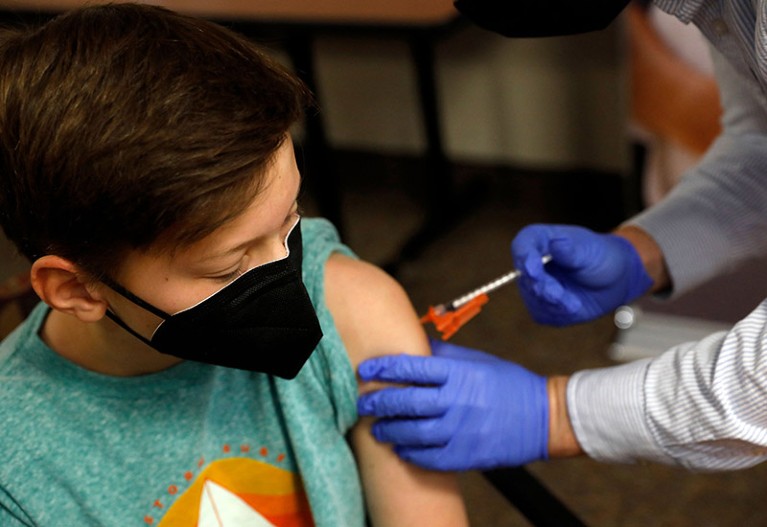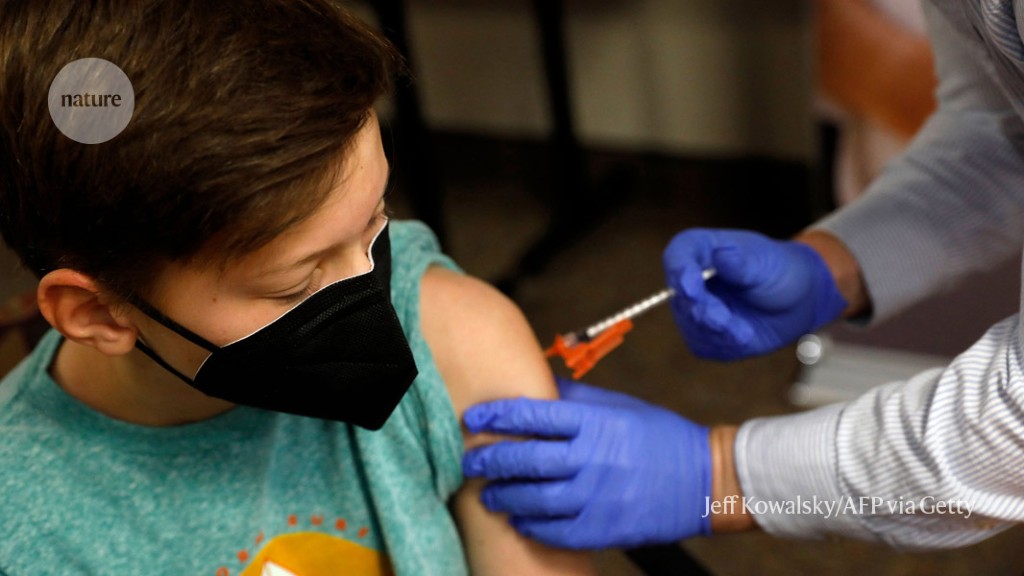

Uptake of COVID-19 vaccinations for children in the United States has been low, even when compared with the rates of influenza vaccination in this age group.Credit: Jeff Kowalsky/AFP via Getty
Vaccinated children are less likely than unvaccinated children to develop long COVID, the myriad of symptoms that can last for months to years following a SARS-CoV-2 infection, according to a forthcoming US study1.
“This is really important data,” says Jessica Snowden, a paediatric infectious-disease specialist at the University of Arkansas for Medical Sciences in Little Rock. She says that in the United States, COVID-19 vaccines are recommended for children as young as 6 months old. But uptake has been low. “This will demonstrate to families how important it is that we protect our kids, not just from acute COVID, but from the longer-term impacts of COVID as well.”
For the study, Anna Yousaf, a medical officer at the US Centers for Disease Control and Prevention (CDC) in Atlanta, Georgia, and her colleagues enrolled 1,600 children and collected weekly nasal swabs from them for more than a year to check for the SARS-CoV-2 virus. The team narrowed the study to 622 participants — aged 5 to 17 years — who caught COVID-19; 28 went on to develop long COVID. The researchers then calculated the odds of vaccinated and unvaccinated children experiencing ongoing symptoms.
The results, presented in October at the annual health-care conference IDWeek in Boston, Massachusetts, and due to be published in the coming months, demonstrated that vaccination reduced the likelihood of developing at least one long COVID symptom by 34% and of developing two or more symptoms by 48%. Yousaf says that this is likely to be an underestimate, because the study only looked at children who had an infection; it did not consider that the vaccine can reduce the chances of developing the infection, which also decreases the likelihood of long COVID.
Danilo Buonsenso, a paediatric infectious-disease specialist at the Gemelli University Hospital in Rome, says that the study design was “rigorous” but points out that it defined long COVID as the persistence of symptoms after one month, whereas the World Health Organization describes long COVID as symptoms that last for at least two months. He says the study also relied on self-reporting of long COVID and not a clinical diagnosis — a problem because long COVID includes several broadly defined symptoms that children might experience on a regular basis. Both issues will make it hard to calculate the real incidence of long COVID in children, but Buonsenso says the comparison between vaccinated and unvaccinated children is still statistically robust. “It confirms that vaccinations can reduce the burden of long COVID, but not eliminate it,” he says.
Similar results in adults
The findings line up with several recent studies suggesting that vaccines reduce the incidence of long COVID in adults (see, for example, ref. 2). However, paediatric data are limited — a major issue because “children are not little adults”, Snowden says. Their bodies and immune systems are growing and therefore respond to infection and vaccination differently from adults. As such, it was never a guarantee that the vaccine would have the same protective benefit against long COVID. “Studies like this show that kids are worth looking at in and of themselves,” Snowden says.
These data are another argument in favour of vaccination, Buonsenso says, particularly for newborns who have not yet been exposed to COVID-19. Some European countries do not recommend the vaccine for younger children, in part because so many have already been exposed to the virus and thus have some immunity.
Even in the United States, where the vaccine is recommended as an annual booster for children as young as 6 months, vaccination remains uncommon. As of mid-December, 7.8% of US children had received their autumn COVID-19 vaccine, well below the rate of influenza vaccination, at 43.3%. Yousaf thinks that this is because the Omicron variant of SARS-CoV-2 is often thought of as a milder strain — causing light colds that don’t necessarily lead to long COVID. Indeed, a recent US household survey found that the rate of long COVID in children was merely 1.3% in 2022, but that still translates to thousands of kids whose health is affected, meaning they might not be able to run around, play or go to school. “If you read the individual stories, the impact of long COVID on a child’s life can be very severe,” Yousaf says.
“COVID is not going away,” Snowden says. “We are fortunate that so far, the variants are less severe as we’ve gone forward. But that’s not a guarantee. And so anything we can do to protect our children from the long-term impact of COVID is critical.”


